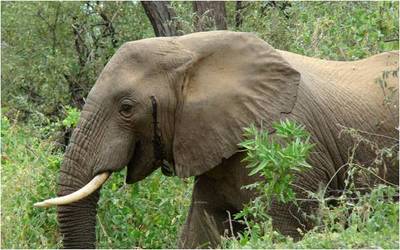 Savannah elephant from dung research project in Kenya. Photo by Marissa Ahlering
Savannah elephant from dung research project in Kenya. Photo by Marissa Ahlering MAY 21, 2013 | by: DarciPalmquist |
The Study: Ahlering, M.A., J.E. Maldonado, L.S. Eggert, R.C. Fleischer, D. Western and J. Brown. 2013. Conservation outside protected areas and the effect of human-dominated landscapes on stress hormones in savannah elephants. Conservation Biology, 27: 569–575.
The Big Question: In East Africa, savannah elephants are increasingly expanding outside of protected parks and into surrounding areas where people and agriculture dominate. Do elephants experience stress when living alongside human populations — even in situations where they are not being actively poached? The answer, according to this new paper from lead author Marissa Ahlering of The Nature Conservancy and colleagues, can be found… in their poop.
Study Nuts and Bolts: The ability to measure stress hormones in wild animals has improved dramatically in the past decade with the development of fecal metabolite analysis techniques. In this study, scientists compared the levels of glucocorticoid (GC) hormone (which increases in response to stress) of elephants in a community conservation area (CCA) established by Maasai pastoralists with elephants at two nearby protected areas, Kenya’s Amboseli and Maasai Mara National Parks. The elephants in the CCA are exposed to “dense human settlements, agricultural areas, and intense livestock grazing on a daily basis,” while the elephants in the national parks are exposed to humans to a lesser extent, only through ecotourism and research.
To measure the stress hormone, scientists collected fresh dung samples from which they extracted DNA and hormone samples. The hormone samples were frozen immediately in liquid nitrogen, transferred to Nairobi for storage and then shipped overnight on dry ice to the United States where they were run through a series of metabolic analyses.
The Findings: The researchers found no evidence of chronic stress in the elephants living within the CCA. The stress levels of the CCA elephants were the same as elephants in the nearby protected area of Maasai Mara, although elephants at Amboseli exhibited lower stress than the other two groups.
What it all Means: The results surprised the researchers — they expected the elephants in the CCA to exhibit higher levels of stress due to a higher degree of contact with humans. These findings indicate that elephants can successfully live in human-dominated areas — and suggest that CCAs should be part of the solution in efforts to restore elephants to areas where illegal ivory poaching has decimated their populations.
http://login.oaresciences.org/whalecomonlinelibrary.wiley.com/whalecom0/doi/10.1111/cobi.12061/pdf
 RSS Feed
RSS Feed
